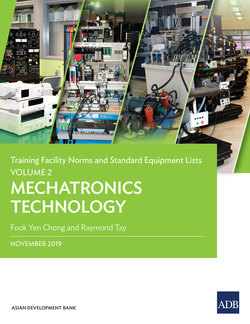Читать книгу Training Facility Norms and Standard Equipment Lists - Fook Yen Chong - Страница 4
На сайте Литреса книга снята с продажи.
ACKNOWLEDGMENTS
ОглавлениеThe Asian Development Bank (ADB) has ramped up lending to the technical and vocational education and training (TVET) sector in recent years. TVET institutions are instrumental in strengthening skills and entrepreneurial capabilities of young people. Improving access, quality, equity, and relevance of TVET is therefore critical to meeting the aspirations of the youth and industry needs. Education and skills development are often unable to keep up with the pace of technological changes, and TVET systems need to adopt new technologies much faster under the fourth industrial revolution. Recent technological developments in the area of artificial intelligence, the Internet of Things, big data analytics, and machine learning have huge implications for TVET. Constant updating of TVET facilities, instructor competencies, and the training system needs to be accelerated.
This ADB technical specification reference guide aims to provide guidance to TVET policymakers and practitioners in the adoption of good practices for the design of training facility norms and standard equipment lists based on industry standards. These specifications are indicative, and should be further contextualized based on the actual needs of the TVET institutions. This volume is the second in a series of technical specification reference guides that cover four strategic trades in the field of manufacturing: (i) precision engineering or machining, (ii) mechatronics technology, (iii) mechanical technology, and (iv) electrical technology.
Precision machining uses cutting tools to produce parts and components widely used in automotive parts and component manufacturing, aerospace parts frames, components manufacturing, and die or mold making. Mechatronics technology combines mechanical, electronics, computer, and electrical technology to support automation in manufacturing processes. Mechanical technology is the application of engineering and scientific principles to ensure the smooth operation and efficient use of machinery and mechanical equipment. Electrical technology is the application of science and engineering principles to install, operate, maintain, and repair electrical instruments and wiring in residential, commercial, and industrial settings.
Fook Yen Chong, Social Sector Specialist, Human and Social Development Division (SAHS), South Asia Department, ADB, and Raymond Tay, ADB consultant in Singapore, prepared this volume. The peer reviewers were Shamit Chakravarti, Principal Social Sector Specialist, Human and Social Development Division, Southeast Asia Department; and Francis Arcenal, TVET Consultant in the Philippines. Ryotaro Hayashi, SAHS provided valuable comments, Alfredo P. Garcia and Ma. Cristina S. Bardos, SAHS provided administrative assistance. The authors are also grateful for the cooperation of Nanyang Polytechnic International and ITE Education Services in Singapore for taking photos of their training facilities at their campus.
Sungsup Ra
Director, Human and Social Development Division
South Asia Department, ADB
